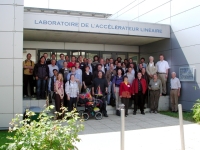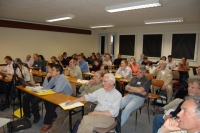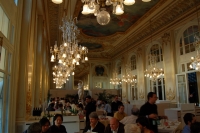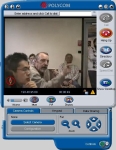 |
 |
|||||||||||||
|
|||||||||||||
|
|||||||||||||
|
Even the best detector will be useless without clever reconstruction algorithms and software. On 2-4 May 2007, the ILC Software Workshop was held at LAL, Orsay (France). The whole chain of data processing was reviewed there: software framework and tools, algorithms and physics results. At the end of the workshop, DESY physicist Ties Behnke summarised that significant progress has been achieved over the past year and important performance milestones are close to being reached, even though the community is still small. Cambridge physicist Mark Thomson, finished his contribution declaring he was now convinced that Particle Flow Algorithm (PFA) can meet the ILC performance goals at 500 GeV and 1 TeV.
This workshop emerged from previous European software meetings. For this year's meeting, all four detectors concepts and three regions were encouraged to participate and were represented. More than 70 participants, mostly European, attended the workshop. Thanks to a live webcast, people from North America and Asia who could not come in person followed the meeting virtually. As the tools and algorithms have become more mature, the focus of this meeting has shifted from the very much technical discussions of previous meetings to an in-depth review of algorithms and methods. The much improved performance of particle flow makes it possible to attempt an optimisation of the detectors driven by particle flow. Similarly, new tools for tracking and vertexing are becoming available and allow an optimisation of sub-detectors as well.Technical questions still play an important role though. Attendees reviewed the whole chain of simulation and reconstruction during the meeting such as simulation programmes, reconstruction routines, vertexing packages or tracking systems. A close cooperation with the accelerator community was visible in the machine detector interface session, where participants discussed methods and results on expected backgrounds. Most of the tools share the same data model, the Linear Collider Input Output (LCIO), readable by everyone in the world. “The key word here is interoperability,” said Roman Pöschl, chair of the workshop. “LCIO must become our common language, and now I see it becoming real.” During the meeting, scientists also discussed some evolutions of the LCIO model. While the implementations are different for the different concepts and regions (for example, the U.S. uses Java, while Europe and Asia use C++) the common data model really improves communication and cooperation. LCIO will be of central importance in the upcoming test beam experiments.The CALICE (Calorimeter for Linear Collider Experiment) collaboration is pioneering using this data format for test beams. Others follow suite: both the vertex detector community and the TPC community develop DAQ systems based on LCIO and the ILC software suites. For data access and computing, the Grid is the platform chosen for the ILC. “We don't ask anymore if we are using the grid, but how we are using the grid,” said Pöschl. It allows to access data from everywhere and pools resources thanks to its distributed structure. A general problem which became visible during the workshop is a shortage of people and resources. Many of the most pressing open questions cannot be solved fast enough, and support for users is still too weak. “If we want to support the ILC community as it moves towards more fully simulated and understood detector concepts, a significant increase in resources and people is needed,” concluded Behnke. The date for the next software meeting is not yet fixed, but attendants have already started to prepare for the next round of discussions. Physicists expect new results over the next few months, and significant progress is expected in understanding the optimisation of the detector concepts. Workshop links : Website - Talks - Photos -- Perrine Royole-Degieux |
|||||||||||||
| © International Linear Collider |



